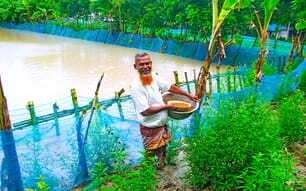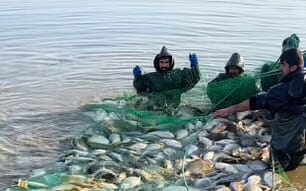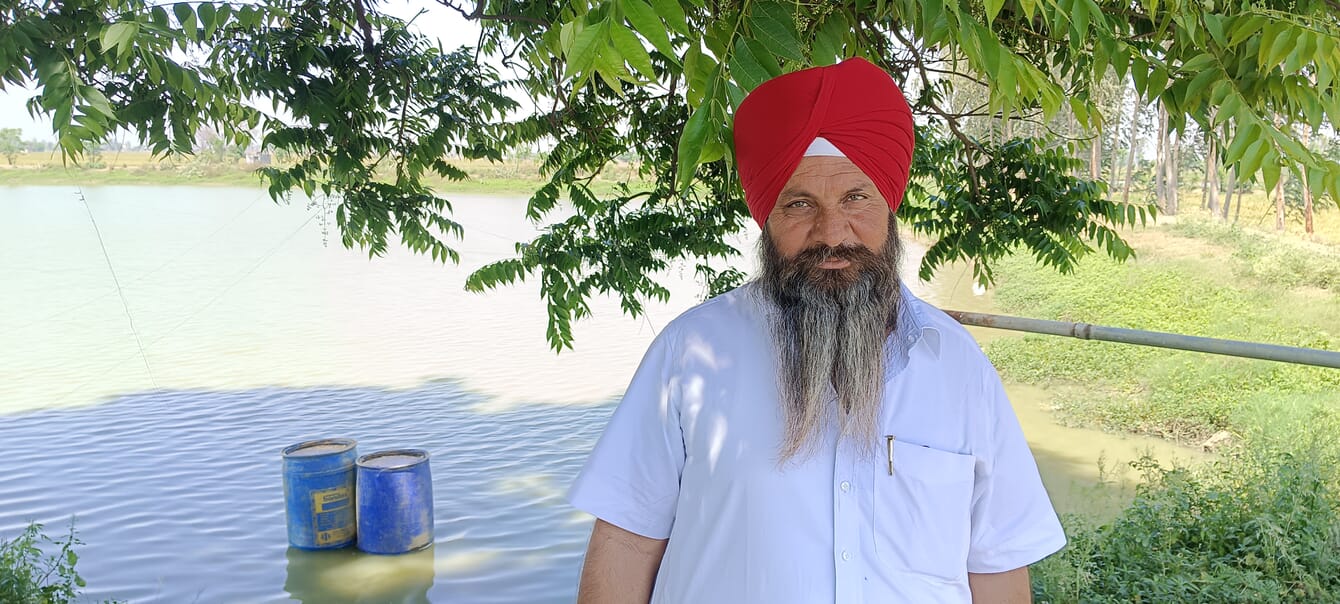
© Gurvinder Singh
What inspired you to embark on a career in aquaculture?
I was born in the village of Karodian in the Ludhiana district of Punjab, and my father was a farmer who grew paddy and other crops. I studied until tenth grade and was involved in farming along with my father.
In 1999, a farmer of our village started culturing fish in 3 acres of pond, but somehow he was not very successful. He decided to close the business and return to paddy farming. I considered giving fish farming a try and took the 3 acres of land from him on a lease of 2 years. There was no exchange of cash. We traded our 3 acres of land in-exchange for his pond.
We started cultivating Indian major carp (IMC) and were helped by state government officials, as well as scientists, who provided me with technical training in fish farming. Aquaculture proved a profitable venture for me and I have not looked back since then. I don’t remember the exact profit in the first year but I am sure it was more than that of paddy farming.
Did you take any formal training in fish farming?
Yes, I was trained by the scientists from Guru Angad Dev Veterinary and Animal Sciences University (GADVASU) in Punjab and I was also supported by the Punjab government. Honestly, I didn’t have any fear of fish farming even though It was my first attempt, and despite the success rate in our area being very low. Most of the farmers took to farming without having any prior knowledge, resulting in losses.
What is the size of your farm and what species do you produce?
The total size of my farm is 27 acres, and this is spread across 6 ponds. We stock 4000 juveniles per acre, and with this there is not much issue of mortality. We start selling the fish after they attain a weight of 600 grams in six months. We can even stock them for further growth depending upon the demand in the market.
We mainly produce Indian major carp (IMC) such as Rohu (Labeo rohita), Katla (Labeo catla) and Mrigal (Cirrhinus cirrhosus).
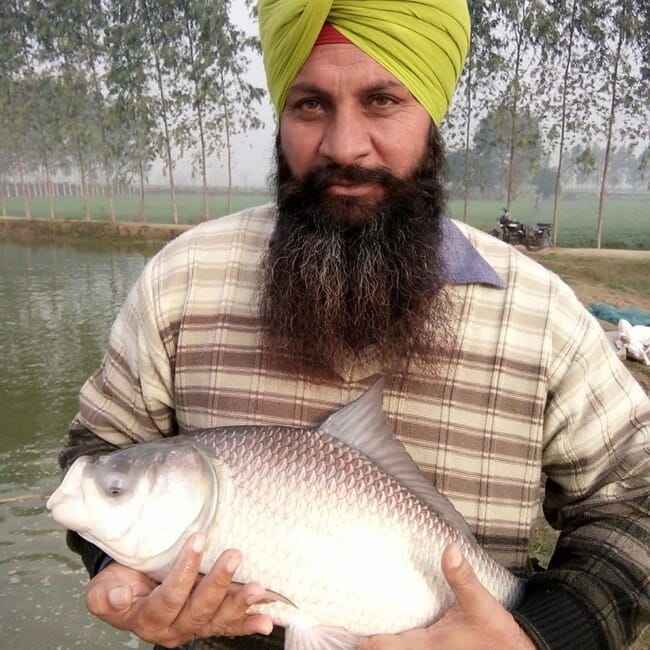
© Gurvinder Singh
What is your total production and how do you procure your feed and seed?
The total production is around 80,000 kilograms per year and we procure our seeds from government and local hatcheries, and also from West Bengal. We manufacture our feed ourselves using rice bran, mustard, salt, soya and other ingredients.
What challenges have you faced with your farm?
The major challenge is the absence of quality seeds in Punjab - we have to procure them from other states which takes time and sometimes the seed quality is poor, which affects production.
What is your typical day at work?
It is very necessary to wake up early for fish farming. I wake up at around 4 AM and come to the pond by 4.45 AM - the morning is the best time to know if there are any issues in the pond. I then provide feed to the fish and go to the market where I also have three shops for wholesale and retail selling of fish.
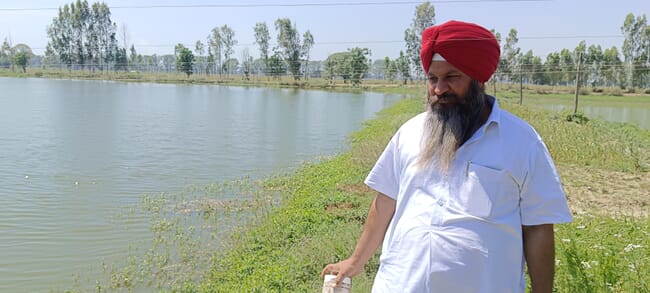
Jasvir begins every day with a visit to his ponds before heading to market © Gurvinder Singh
Do you think farmers should also market their own fish?
Yes, it helps them to get a better price for their produce by eliminating the middle-men. They should at least do wholesale trading even if they do not want to do retail business.
What is your biggest worry at work?
I don’t face any worries because if the water and seed quality is good then the production would be automatically better. If farmers give proper attention to their work then there is nothing to worry about.
Has your farm faced any financial losses?
Yes, I faced severe losses due to my lack of proper experience in 2002. Around 12,500 kg of fish had died resulting in losses worth Rs 4 lakhs ($4802). I blame my inexperience for it but I did learn a valuable lesson from my mistake.
Are there any individuals or departments who have supported your career?
Yes, Darshan Singh - a veteran fish farmer in a neighbouring village - guided me a lot on fish farming. I used to take guidance from him whenever I faced any difficulty. I am also thankful to the state fisheries department officials and GADVASU scientists who helped me out.

© Gurvinder Singh
Have you received any awards for your work?
Yes, I have received the GADVASU best fish farmers’ award in 2015 and another from the state government in 2016.
What are your ambitions for your work?
I think that youths should join the profession, and I am ready to train them in fish farming if they do. I am even training my children in fish farming.
What is your advice for budding fish farmers?
My advice would be to gain proper knowledge as the business has good prospects, but it is very necessary to have a training before starting in it. Farmers should stock juveniles in their ponds by April so that they can get a harvest within the same year.
Do you think your story shows the potential of career opportunities in India, as opposed to abroad?
Yes, it’s true. It is a tendency in almost every household in Punjab that the youth wants to go out and settle in foreign countries looking for better opportunities. Most of the families have to sell their land holdings to fund tickets and other expenses, and often youths end up in menial jobs . They end up ruining their lives in some of these cases.
I always wanted to stay in my native state,Punjab, and build my career here. My success is an example for others that there are lot of opportunities even in our homes. One has just to explore them and put in lot of hard work in order to become successful.


